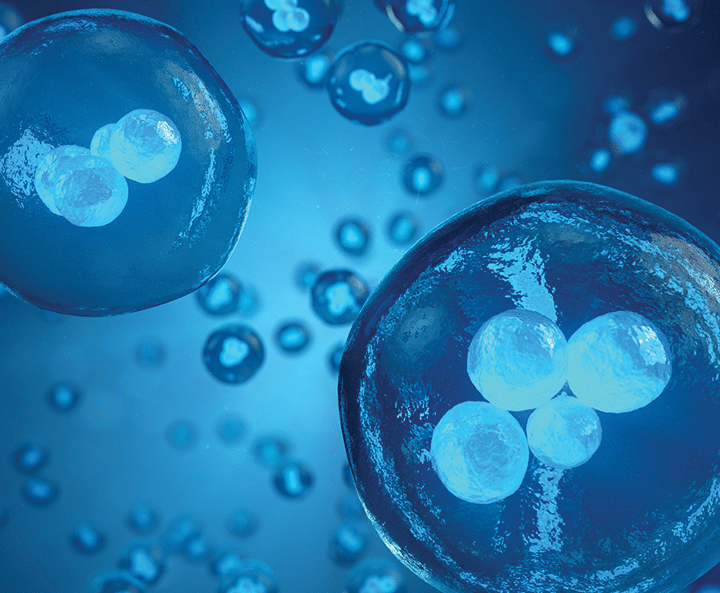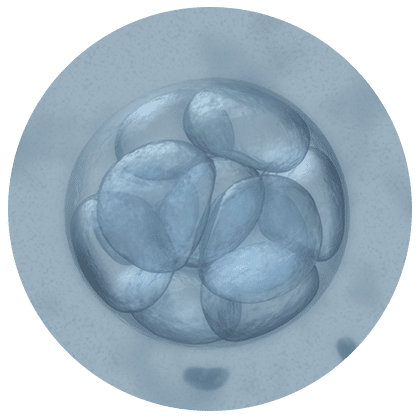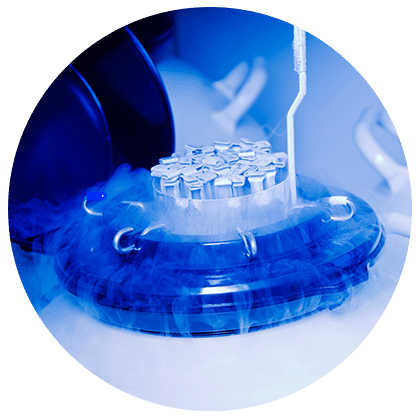
About IVF
In Vitro Fertilization (IVF) is a process by which one or more eggs are fertilized outside the body. Fertilized eggs (embryos) are then transferred into the uterus to obtain a pregnancy. IVF is one of the most successful infertility treatment options available, which is why it is also one of the most popular. It allows couples to overcome many of the typical barriers to conception, such as fallopian tube blockages, low sperm count, diminished ovarian reserve, recurrent pregnancy loss, and unexplained infertility.
Treatment Forms & Medication Instructions: You can now access your important forms and medication instruction videos online via EngagedMD.
Learn more about our IVF success 
How IVF Works
IVF has a period of hormonal injections that stimulate follicles to grow. Each follicle in the ovary is expected to contain an egg. Once follicles have reached an appropriate size, this indicates egg maturity, and the egg retrieval then can take place. After the eggs are retrieved, they are fertilized with sperm to create embryos. Five days after the egg retrieval, the embryos created are called blastocysts and can either be transferred to the uterus or frozen for future use in FET (Frozen Embryo Transfer) cycles.
There is also an option of embryo genetic testing (PGT-A) available with IVF, which allows couples to screen embryos for the correct number of chromosomes prior to implantation. Determining the chromosomes also allows the patient to choose which gender embryo is returned. PGT-A can also lower the incidence of twins since only one normal embryo is returned to the uterus at a time.

Reasons for Pursuing IVF
IVF is known to be the most successful fertility treatment option, given that it allows for the most control over a reproductive cycle and helps address the most common and difficult barriers to achieving pregnancy. In particular, IVF can help address the following:
• Absence or blockage of the fallopian tubes
• Functionally damaged tubes
• Male factor infertility
• Long standing infertility despite conventional therapy
• Endometriosis
• Unexplained infertility
• Recurrent pregnancy loss

Spotlight on
Minimal Stimulation IVF
IVF typically involves high doses of stimulating injectable medications however, for women with a low egg reserve, a standard protocol may not result in the same successful outcome. For women experiencing diminished ovarian reserve, whose ovaries provide 5 or fewer eggs per cycle, aggressive stimulation may not be cost effective. These women may be candidates for minimal stimulation IVF protocol, which uses a less aggressive dosage of medication.
Choosing the Number of Embryos to Transfer
Our focus is to optimize your pregnancy rate, while reducing the risk of multiple gestation and high-order multiple gestations. Egg age and embryo quality are the most important determining factors in the number of embryos that are safe to transfer.
With an egg age of 35 years old or younger, there is an excellent chance of success with single embryo transfer. Embryos that are created from eggs that are of an older age have a lower chance of being chromosomally normal. In some cases, the purpose of transferring more than one embryo is to increase the chance that a chromosomally normal embryo will be available and implant.

More About IVF

Addressing Male Factor Infertility
If the male partner has a very low sperm count or poor sperm motility, then fertilization is achieved by injecting a single sperm into each egg in a process called Intra-Cytoplasmic Sperm Injection (ICSI). This helps increase the chance of successful fertilization.
Learn more 
Embryo Genetic Testing
Embryo Genetic Testing is an innovative technology used in IVF cycles. This technique involves the biopsy of an embryo, and testing of the cells to ensure the correct number of chromosomes, determine gender prior to transfer, or to detect genetic mutations. Embryo genetic testing can increase implantation rates and decrease the risk of recurrent pregnancy loss.
Learn more 


Embryo Cryopreservation
Embryo cryopreservation, or embryo freezing, is often used when patients are preparing for a future Frozen Embryo Transfer (FET) cycle or if they have additional embryos beyond those needed for transfer. The advantage of embryo cryopreservation is to give the patients an added chance of achieving a pregnancy without having to undergo a complete IVF stimulation cycle for future pregnancies, and this is also used in Embryo Genetic Testing cycles.
Learn more about FET 
Affording Care
Most patients receive some, if not full, insurance coverage for reproductive treatment.
Learn more about affording careAt South Jersey Fertility Center, we understand the emotional and financial struggles that often come with attempts to conceive. We specialize in providing affordable care to all of our patients, striving to help as many couples as possible start families of their own.
As a mandated state, New Jersey requires insurance companies to provide benefits for fertility care, meaning that most of our patients receive some, if not full, insurance coverage for their care. Our dedicated financial counselors welcome the opportunity to walk patients through potential costs and financial options for affordability, and we provide new patients with detailed information to help simplify the process and fully answer questions up front. We never want to cost or insurance complications to get in the way of our patients achieving their dreams. Contact us to discuss pricing and options for our IVF program with our financial counselors.


Medication Instructions
Learn how to safely and effectively use your injectable medications.
Learn more

Preparing for IVF
Tips on how to best prepare yourself for your upcoming IVF journey.
Read more

Financial Assistance
Learn about discount programs and other ways we support the financial aspect of fertility care.
Read more


